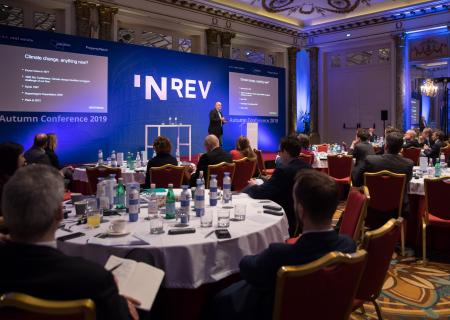Embracing transformation
On the road to a digital real estate industry
The real estate investment industry has started to embrace digital transformation. Even though this process may still be in its early stages, the transformation is accelerating. Digital innovation is starting to disrupt the technologies and processes that real estate uses, as well as making an impact on the structures, strategies and cultures that underpin it.
While real estate may be lagging behind other industries, digital transformation now promises great opportunities for those businesses prepared to take the plunge as early adopters. Nowhere is this truer than in the context of real estate investment.
Digital transformation now promises great opportunities for those businesses prepared to take the plunge as early adopters.
Of course, the implications for the real estate industry as a whole could be immense. That’s why INREV has set up a Technology Committee to encourage it to make use of the technologies and solutions that already exist in the digital arena – particularly building on the potential of data analytics, Artificial Intelligence and the Internet of Things. It is also calling on market participants to collaborate more intensively with technology providers in order to spur on this revolution.
The committee has released its first paper ‘The future of the real estate Industry: Enabling new data-driven business models’, available to download on the Technology Committee page. More papers will follow in 2020 that will tackle some current Real Estate challenges and how technology can address them.
So what are the first steps that real estate organisations need to take when embarking on their digital journey?
Data is key
For the real estate investment industry, which generates a wide variety of data and also involves many participants in its processes, the targeted use of data can have a substantial impact on business success. Most real estate organisations have a huge amount of internal information stored in a decentralised physical form, which would be much more valuable if it could be accessed more easily and more widely.
Data and information have a big role to play in enhancing communication, both between systems and with users. The widening use of digital information helps to dismantle data silos, which should in turn enrich the overall real estate value chain. Practical applications along these lines include:
- Building a fully integrated investment management data system, which can allow internal and external data to be centrally collected, validated and stored so as to enhance transparency and enable its automatic distribution to relevant stakeholders.
- Using Business Intelligence (BI) systems to provide the technological solutions for creating this kind of network. Of the shelf systems of this kind include Microsoft’s Power BI and Qliksense.
- Digitising physical documents – for example lease contracts – which can make a big contribution to automation, especially in real estate operations, and also foster greater efficiency, transparency and effectiveness in real estate transactions.
- Using Internet-of-Things (IoT) technology to support predictive maintenance, potentially raising occupier satisfaction and reducing building operation costs, as well as enhancing sustainability.
- Analysing customer behaviour data to offer services better tailored to the needs of property users, perhaps ultimately involving AI-driven smart assistants to manage buildings and even provide entertainment.
As investing organisations often need to use information generated externally as well as internally, data standards are becoming an important piece of real estate industry infrastructure. INREV has recognised this, and is working with its regional partners NCREIF, PREA and ANREV to create a common set of terms as a critical component of the global standardisation of definitions and data.
Building a digital ecosystem
Data standards are just one part of the digital ecosystem that the real estate industry will need to develop and adhere to in order to use digital technologies most effectively. One goal of such an ecosystem would be to make data accessible and useful for all, and thus allow for a flexible and dynamic collaboration among a wide range of organisations. Bringing together human and financial resources from across organisations to further their digital development, the ecosystem would support each member’s value chain and will give market players greater power to implement industry initiatives and to define relevant guidelines.
In the case of real estate, another role of the digital ecosystem would undoubtedly be to foster collaboration and communication between the industry and technology providers, the ‘PropTechs and ‘FinTechs’. This sort of collaboration is already helping to improve efficiency for some real estate businesses’ and is providing a deep source of data for business decisions. But to take this to the next level and bring operational excellence to the whole real estate investment industry will mean sharing data right across the community and to setting industry standards for data management.
In the case of real estate, another role of the digital ecosystem would undoubtedly be to foster collaboration and communication between the industry and technology providers
Moving minds
Ultimately, a shift in mind set will be needed if organisations are to maximise the potential of the data they hold - one that all its personnel will ideally take part in. The success of a firm’s digital transformation will require a broad understanding of how such a revolution can help it meet its values, needs and ambitions. Everyone needs to feel that they are in the same boat. To make this happen, the company’s leaders must set out a joint purpose and a compelling and tangible vision of the future, in order to motivate employees with the knowledge that the process of digitalisation is geared to achieving business success.
This article was contributed by the INREV Technology Committee
For feedback or questions about this topic, you can reach out to rui.mendes@inrev.org








